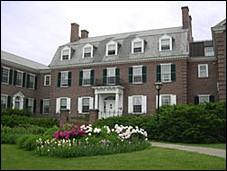The residency program employs a competency-based curriculum for all rotations.
In areas that overlap with the categorical program, the 2 tracks share common curricula. The highlights of the PCT curriculum are to develop knowledge and skills in:
- Appropriate subspecialty competencies (e.g. dermatology, orthopedics, women's health, geriatrics)
- Assessing and meeting community health needs
- Communication skills
- Evidence-based medical decision making
- General ambulatory and inpatient internal medicine
- Information management
- Lifelong learning
- Population approach to health care
- Practice management (clinical and business)
- Quality improvement in health care (including working in teams)
Core Experiences
- Inpatient experience: PCT residents spend 5 to 7 months each year on inpatient rotations. These rotations include general medicine wards (VA and Dartmouth Hitchcock Medical Center), intensive care unit, inpatient cardiology, and inpatient hematology-oncology rotations. Because intensive care training is often critical for rural practice, primary care residents spend a total of 2 months training in ICU rotations and 2 months in CCU rotations over the 3-year training period. PCT residents gain additional inpatient experience through inpatient activity during community-based rotations. One inpatient general medicine consultation rotation is scheduled during the senior year.
- Emergency department: PCT residents develop competence in the emergency room setting during block rotations at Dartmouth Hitchcock Medical Center, inpatient rotations at the VA, and during their community health rotations.
- Research electives: As in the Categorical Track, PCT residents are encouraged to use 1 or more elective months to accomplish their required research project. Residents have easy access to faculty willing to engage in planning and implementing projects or in incorporating residents in their own research. Planning for the research projects is coordinated by the Department of Medicine Resident Research Coordinator.
Ambulatory electives
Ambulatory subspecialty electives and subspecialty clinics are a valuable setting in which to learn skills necessary to be a practicing general internist. Five ambulatory elective rotations per year (4 in PGY-1) provide intensive training in managing the complexities of outpatient clinical problems and medical practice. Each 1-month rotation combines intensive subspecialty ambulatory clinical elective experiences with an expanded resident continuity clinic. Subspecialty electives can be scheduled in flexible and creative ways based on the needs of the resident.
Longitudinal clinical experiences
PCT residents see their own patients in continuity clinic 1 to 2 half-days per week during their Y blocks throughout their 3-year residency. This intensive longitudinal involvement provides a true continuity clinic experience. Residents will conduct their continuity clinics either at Dartmouth Hitchcock Heater Road Clinic or Dartmouth Hitchcock Lyme Clinic.
Community Health Block Rotations
In each of the 3 years, PCT residents practice for 2 months in community-based practices in rural or suburban settings under the supervision of experienced community-based primary care faculty. These rotations provide outstanding clinical and medical practice organization experience. Opportunities to travel outside the region or participate in international health care during a community-based rotation are available.
During these rotations, residents participate in all aspects of medical practice that are primarily outpatient experiences, but hybrid inpatient/outpatient, extended care facility, and other health care settings are also available. These settings include private practice and community group practices, a micropractice, hospital-based practices, Dartmouth College’s student health clinic, a local retirement community’s primary care clinic, mobile health units working with migrant populations and many rural clinics in New Hampshire, Vermont and Maine. Residents usually continue to see patients at their longitudinal clinic site for 1 or 2 half days per week during their community health block.
Rural Health Equity Intensive
In their third year, PCT residents will participate in a month-long ambulatory experience comprising multiple domains essential to their development as leaders in primary care. The Rural Health Equity Intensive invites PGY-3s to see patients once a week at a regional Federally Qualified Health Center (Health First in Canaan, NH), a clinic for patients struggling with substance abuse and addiction (Connecticut Valley Addiction Recovery) and a special ‘teaching clinic’ at their main continuity clinic site, where they will be responsible for precepting interns and/or fourth year medical students (under the guidance of an attending physician). Additionally, residents will conduct 4 weekly home visits to see appropriate patients from their own panels during this rotation.
